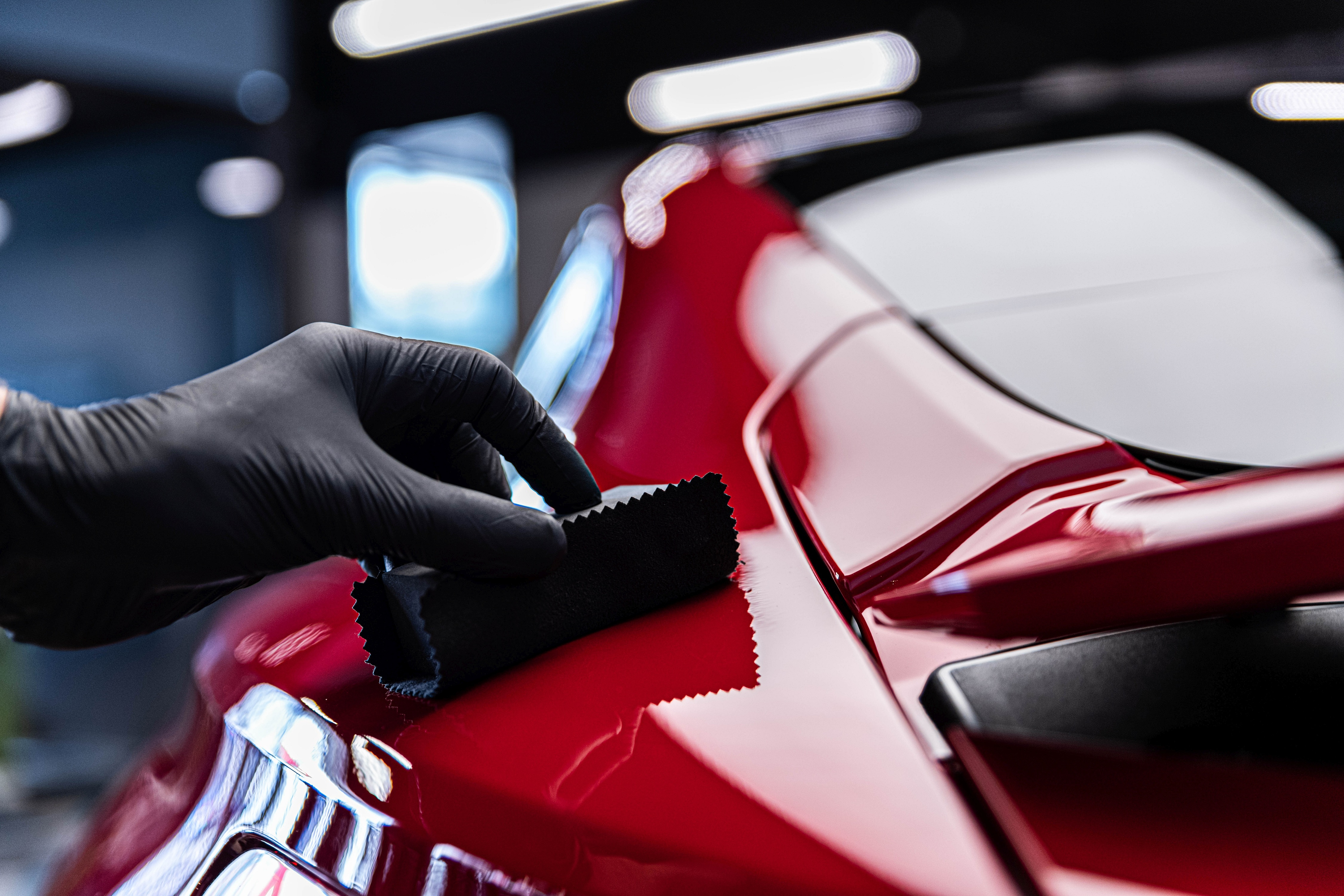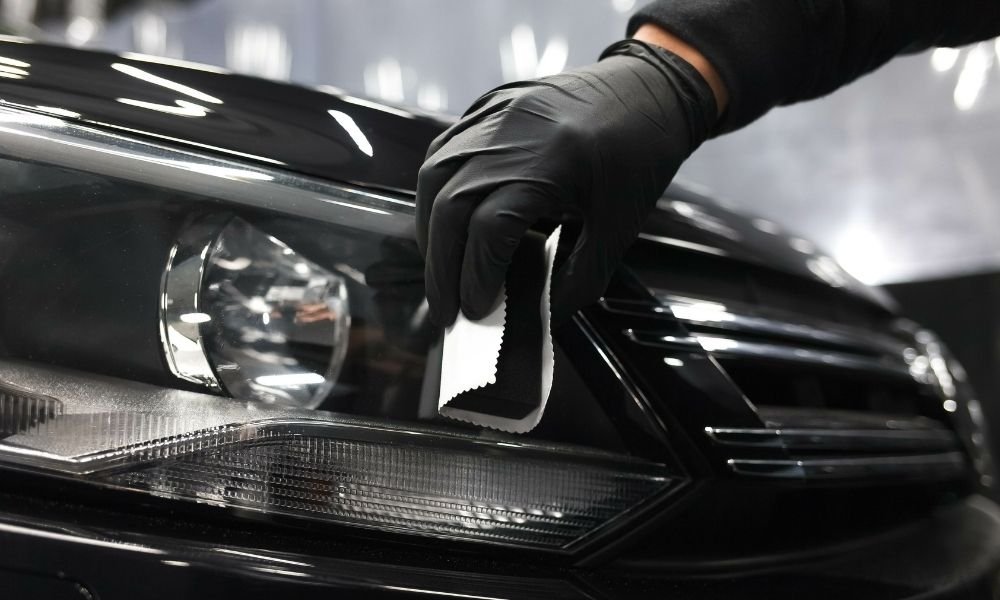Are Final Touch Auto Works Ceramic Coatings Worth the Investment? A Cost Breakdown
Are Final Touch Auto Works Ceramic Coatings Worth the Investment? A Cost Breakdown
Blog Article
The Ultimate Guide to Ceramic Coatings: Enhancing Your Vehicle's Finish and Sturdiness
If you're wanting to elevate your automobile's appearance and security, ceramic layers could be the service you've been looking for. These advanced coverings bond with your lorry's paint, creating a long lasting obstacle versus environmental damages. But exactly how do they compare to typical wax? Understanding the benefits and application process can make a significant difference in your vehicle care regimen. Allow's discover what makes ceramic finishings a beneficial investment for your lorry.
What Are Ceramic Coatings?
Ceramic coverings are sophisticated protective layers that boost your car's exterior. They're made from a liquid polymer that chemically bonds with your automobile's paint, creating a long lasting shield. Unlike standard wax or sealants, which wear away in time, ceramic finishes offer resilient security versus environmental pollutants like UV rays, dust, and chemicals.When you apply a ceramic coating, you're purchasing a barrier that wards off water, making it less complicated to clean your auto and maintaining it looking more recent for longer. This modern technology aids preserve the integrity of your paint, minimizing the risk of scrapes and oxidation.Ceramic coverings come in numerous formulas, each developed to satisfy different demands and preferences. You can select a do it yourself package or choose expert application, relying on your comfort degree and budget plan. In general, ceramic finishes stand for an innovative option for keeping your vehicle's visual charm and longevity.
Advantages of Ceramic Coatings
When you purchase a ceramic layer, you expose a series of advantages that surpass simple visual appeals. To start with, it gives phenomenal protection against ecological contaminants like dust, bird droppings, and UV rays, keeping your cars and truck's paint looking brand-new longer. You'll discover that maintenance becomes less complicated, as the hydrophobic buildings trigger water and crud to slide off effortlessly. This means much less time spent washing and outlining your vehicle.Additionally, ceramic finishings can improve the gloss of your car's surface, providing it that showroom luster. They also offer resistance to scrapes and swirl marks, which assists keep your automobile's resale worth. With a ceramic finish, you're not simply shielding your investment; you're likewise boosting its overall look and durability. Inevitably, this sophisticated modern technology guarantees your automobile stands out while enjoying long-lasting advantages that standard waxes merely can not match.
The Application Refine: How to Use Ceramic Coatings
Applying a ceramic finish includes a number of crucial actions to guarantee suitable outcomes. Thoroughly wash your automobile to remove any dust, grime, or pollutants. This assures the surface is all set and tidy for the finishing. Next off, sanitize the paint using a clay bar to remove embedded fragments. Later, inspect the paint for flaws and brighten it to attain a smooth surface.Once your cars and truck's surface area is prepped, use the ceramic finish in little areas. Utilize an applicator pad to spread out the covering uniformly, complying with the producer's guidelines. Permit the coating to heal for the recommended time, commonly between one to two hours, depending upon the product.Finally, stay clear of washing your automobile for at the very least a week to allow the finishing bond effectively. Complying with these steps will certainly aid you attain a long lasting, high-gloss coating that shields your car for years to come.

Contrasting Ceramic Coatings to Conventional Wax
After guaranteeing your automobile's surface area is perfectly prepped with a ceramic layer, it's time to ponder just how this contemporary solution piles up versus standard wax. Ceramic finishes supply a robust layer of defense that lasts for years, while wax generally offers just a couple of weeks of sparkle. You'll observe that ceramic finishings bond with your paint, creating a hydrophobic surface area that pushes back water and dust, making upkeep easier.In contrast, standard wax rests on top of the paint and requires constant reapplication. With ceramic coverings, you get exceptional scratch resistance and UV security, assisting to prevent fading and oxidation. While the preliminary investment for a ceramic coating is higher, the lasting benefits typically surpass the expenses. If you're looking for toughness and enhanced gloss, ceramic coatings are a clever option over traditional wax.
Upkeep Tips for Your Ceramic Covered Automobile
To keep your ceramic-coated lorry looking excellent, regular maintenance is necessary. Start with a mild laundry making use of a pH-balanced hair shampoo; avoid severe detergents that can deteriorate the finishing. Make use of a microfiber wash mitt to stop scrapes and constantly rinse thoroughly to eliminate any type of soap residue.After washing, completely dry your cars and truck with a soft microfiber towel to avoid water areas. Consider using a ceramic maintenance spray every couple of months to enhance the finishing's hydrophobic homes and add an added layer of protection.It's likewise important to prevent automated automobile cleans with unpleasant brushes, as they can harm the coating. Instead, select hand cleans or touchless laundry choices. Furthermore, on a regular basis examine your vehicle for pollutants like tree sap or bird droppings and address them promptly to avoid etching. Following these pointers will aid preserve the shine and toughness of your ceramic-coated car for many years ahead.
Usual Myths Concerning Ceramic Coatings
In spite of the hop over to here impressive advantages of ceramic coverings, several misconceptions can produce confusion for automobile owners. One typical misconception is that ceramic finishings get rid of the requirement for maintenance. While they do supply improved security, regular washing and treatment are still necessary to keep that high-gloss finish.Another misconception is that these finishes are scratch-proof. While they offer a solid layer of defense against small scratches, they can't hold up against severe impacts or abrasive materials.Many likewise think that ceramic coatings will certainly make their autos unsusceptible to all pollutants. In fact, they push back dust and water yet won't avoid concerns like bird droppings or tree sap from creating damage if left unattended.Lastly, some assume that using ceramic finishes is a do it yourself task anybody can handle, but achieving a perfect application typically needs specialist competence to ensure peak results.
Selecting the Right Ceramic Layer for Your Cars and truck
How do you select the appropriate ceramic finishing for your car? Beginning by taking into consideration the level of security you require. If your car deals with harsh weather or frequent road journeys, go with a high-end covering that supplies superior sturdiness and resistance to scrapes, UV rays, and chemical stains.Next, consider the application method. Some coverings need specialist installation, while others are DIY-friendly. If you're experienced, a DIY product may conserve you money, but for the most effective results, a specialist can ensure proper application.Don' t neglect to check the longevity of the finish. Some last a couple of years, while others can secure for a years or even more. Review reviews and endorsements to assess user satisfaction. By evaluating these variables, you'll locate a ceramic covering that not just boosts your auto's look but additionally gives long-lasting defense.
Regularly Asked Questions
How Much Time Do Ceramic Coatings Last typically?
Ceramic finishings usually last anywhere from 2 to five years, depending on variables like application, upkeep, and ecological problems. You'll intend to comply with correct treatment regimens to optimize their long life and efficiency.
Can Porcelain Coatings Be Applied Over Paint Scratches?
You can't apply ceramic finishings over paint scrapes successfully. It's best to fix any kind of scratches first, making certain a smooth surface - Final Touch Auto Works Ceramic Coatings. By doing this, the finish bonds correctly and gives excellent defense for your lorry's surface
Are Ceramic Coatings Safe for All Auto Surfaces?
Ceramic coverings are typically safe for a lot of automobile websites surface areas, including paint, glass, and wheels. Nonetheless, it is important to check particular product guidelines, as some finishings may not be ideal for sure materials or surfaces.

Will Porcelain Coatings Protect Against UV Damage?

Can I Do Touch-Ups on Ceramic Coated Surfaces?
You can do touch-ups on ceramic layered surface areas, but it's critical to utilize compatible products. Confirm the area is tidy and adhere to appropriate application techniques to keep the finishing's honesty and efficiency. Unlike traditional wax or sealers, which use off over time, ceramic finishes give long-lasting defense versus environmental contaminants like UV rays, dirt, and chemicals.When you apply a ceramic covering, you're spending in a barrier that wards off water, making it much easier to clean your cars and truck and keeping it looking more recent for longer (Final Touch Auto Works Ceramic Coatings). Afterward, inspect the paint for blemishes and polish it to accomplish a smooth surface.Once your automobile's surface is prepped, Clicking Here apply the ceramic finishing in little sections. Allow the layer to treat for the recommended time, typically between one to 2 hours, depending on the product.Finally, prevent cleaning your automobile for at least a week to let the coating bond effectively. Take into consideration using a ceramic upkeep spray every couple of months to enhance the covering's hydrophobic homes and add an added layer of protection.It's likewise sensible to avoid automatic automobile washes with abrasive brushes, as they can harm the covering. Ceramic finishings are generally safe for many car surface areas, consisting of paint, glass, and wheels
Report this page